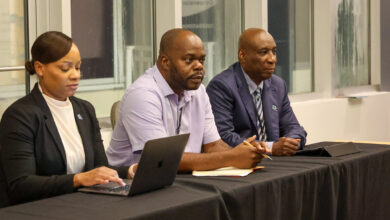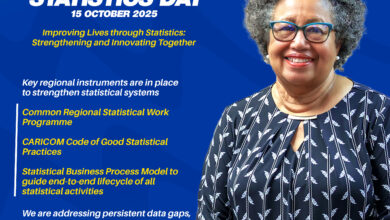(CARICOM Secretariat, Turkeyen, Greater Georgetown, Guyana) In the face of unfulfilled expectations in the range and quality of statistical data in the Caribbean Region, policy-makers and researchers need to create a symbiotic relationship that would ultimately produce good socio-economic planning, Mr. Neville Grainger, Vice President Finance, Caribbean Development Bank (CDB) said.
Mr. Grainger made the recommendation in remarks at the closing ceremony of the Second CARICOM Regional Demographic Analysis Workshop at the University of the West Indies (UWI) St. Augustine, Trinidad and Tobago on 17 August 2007. The workshop was a component of a CARICOM/CDB project to strengthen the Region’s capacity in Demographic analysis.
“Policy-makers must continue to push researchers to move into new frontiers of information-gathering and analysis, whilst researchers, by developing usable and practicable tools, must continue to feed the appetite of policy-makers for more informed analysis of policy options. In other words, the objective must be to create a symbiotic relationship between the two boundary partners,” he said.
The CDB Vice President lamented the fact that the Region had not fully exploited opportunities for gathering and analysing statistics in an organised and sustainable manner so as to add “clarity and robustness in the analysis of some of the complex issued faced by policy makers.”
“Whilst the quality and organization of the statistical infrastructure varies across countries, the collective wisdom suggests that our efforts to-date in producing the range and quality of statistical data necessary for good socio-economic planning have fallen well short of expectations,” he told the gathering at the Faculty of Social Sciences Lounge.
The efforts that have been made, he noted, are generally driven by externally-driven considerations rather than from recognition of the importance of a well-developed range of statistics to national policy formulation. The shortage of skills in the various branches of the discipline of statistics and lack of resources to sustain past efforts may be some of the contributory factors to the deficiency, Mr. Grainger said.
He stressed, however, that successful public policy outcomes depended on the existence of a rich accessible source of data to support decision-making and address unanswered questions such as: how to provide for an ageing population; how to address the needs of the poor and indigent; and what impact will the loss of some of the Region’s highly trained professionals to the developed word have on societies.
It was his hope that participants of the seven-week workshop and others from another programme conducted last year would form the nucleus of an evolving pool of skills in demographic analysis, as well as their own network to “preserve the legacy of this programme”.
He also underscored the importance of continued collaboration among the CARICOM, CDB, UWI and the United Nations Economic Commission for Latin America and the Caribbean (UNECLAC).





